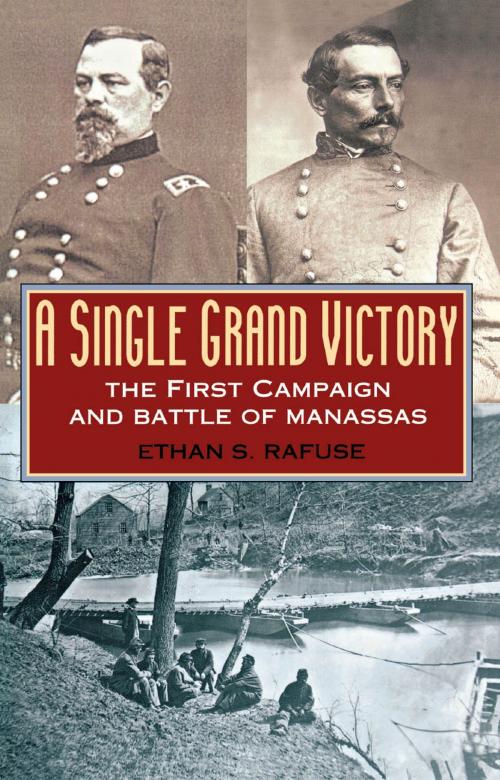A Single Grand Victory
The First Campaign and Battle of Manassas
Nonfiction, History, Americas, United States, Civil War Period (1850-1877), Military| Author: | Ethan S. Rafuse | ISBN: | 9781461617303 |
| Publisher: | Rowman & Littlefield Publishers | Publication: | April 1, 2002 |
| Imprint: | Rowman & Littlefield Publishers | Language: | English |
| Author: | Ethan S. Rafuse |
| ISBN: | 9781461617303 |
| Publisher: | Rowman & Littlefield Publishers |
| Publication: | April 1, 2002 |
| Imprint: | Rowman & Littlefield Publishers |
| Language: | English |
More than 800 men lost their lives and 2,700 were wounded. Confederate General Thomas J. Jackson earned his legendary nickname "Stonewall" here as fellow Confederate General Barnard Bee, later fatally wounded in the battle, shouted, "Yonder stands Jackson like a stone wall!" Both the North and the South believed that a single victory in this first major battle would decide the war before it barely started. Yet the first battle of Manassas, or Bull Run, has not received nearly the same attention as the other major clashes of the Civil War. A Single Grand Victory is a highly readable, concise, comprehensive narrative by Ethan S. Rafuse, professor of history at the United States Military Academy at West Point. Rafuse worked as a park ranger at Bull Run, where he gained great familiarity with the site and the literature on this battle. His new book incorporates insights offered in recent scholarship on Civil War military, political, and cultural history.
The author describes the factors that led President Abraham Lincoln to order an offensive against Confederates at Manassas Junction at a time when his most prominent military men advised against it. The war policies of both the Union and Confederate sides are explained. Rafuse offers descriptions and analysis of the individuals involved and the circumstances that influenced the manner in which the campaign was conducted. He covers the critical events and operational and tactical decisions that shaped the campaign's course and outcome. In addition, A Single Grand Victory provides insights into American life in the nineteenth century by examining what motivated men to fight in 1861 and describing what led both North and South to expect the war would be a short one. Southerners had anticipated that one victory like Bull Run would persuade the North to abandon the effort to restore the Union by force. Northerners believed support for the Confederate rebellion was so shallow that one battle would end the war.
Civil War buffs will enjoy this
More than 800 men lost their lives and 2,700 were wounded. Confederate General Thomas J. Jackson earned his legendary nickname "Stonewall" here as fellow Confederate General Barnard Bee, later fatally wounded in the battle, shouted, "Yonder stands Jackson like a stone wall!" Both the North and the South believed that a single victory in this first major battle would decide the war before it barely started. Yet the first battle of Manassas, or Bull Run, has not received nearly the same attention as the other major clashes of the Civil War. A Single Grand Victory is a highly readable, concise, comprehensive narrative by Ethan S. Rafuse, professor of history at the United States Military Academy at West Point. Rafuse worked as a park ranger at Bull Run, where he gained great familiarity with the site and the literature on this battle. His new book incorporates insights offered in recent scholarship on Civil War military, political, and cultural history.
The author describes the factors that led President Abraham Lincoln to order an offensive against Confederates at Manassas Junction at a time when his most prominent military men advised against it. The war policies of both the Union and Confederate sides are explained. Rafuse offers descriptions and analysis of the individuals involved and the circumstances that influenced the manner in which the campaign was conducted. He covers the critical events and operational and tactical decisions that shaped the campaign's course and outcome. In addition, A Single Grand Victory provides insights into American life in the nineteenth century by examining what motivated men to fight in 1861 and describing what led both North and South to expect the war would be a short one. Southerners had anticipated that one victory like Bull Run would persuade the North to abandon the effort to restore the Union by force. Northerners believed support for the Confederate rebellion was so shallow that one battle would end the war.
Civil War buffs will enjoy this















